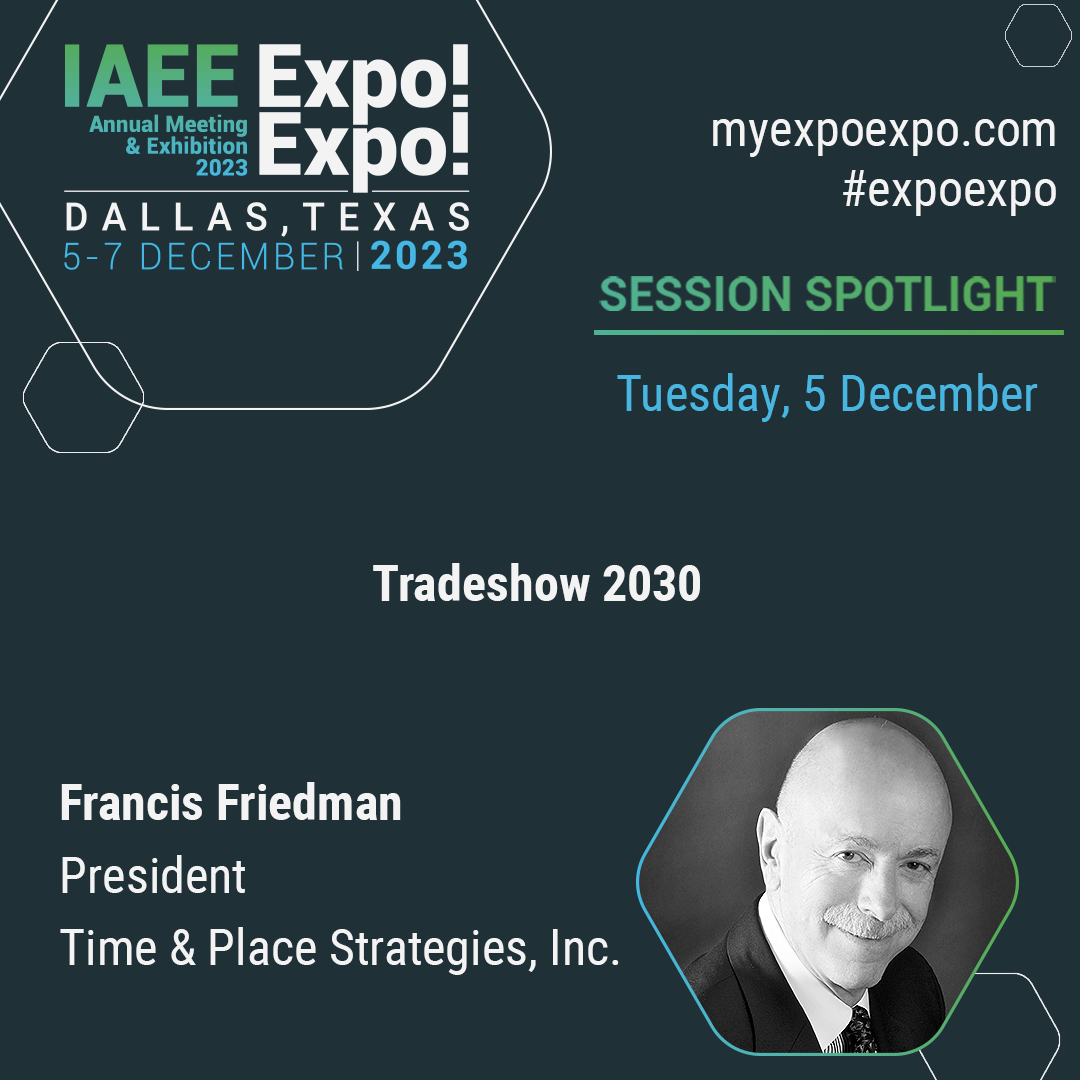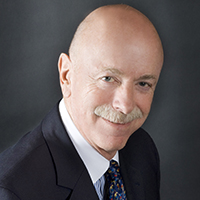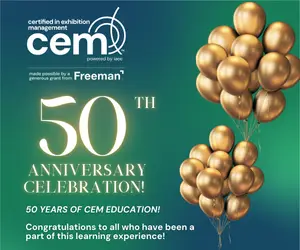By Mary Tucker, IAEE Senior Communications and Content Manager

Expo! Expo! IAEE’s Annual Meeting & Exhibition 2023 features a three-day educational journey covering seven diverse content tracks, including this forward-looking session led by Francis Friedman titled Tradeshow 2030. Today, the technology narrative has taken center stage within our industry. Amid these ongoing discussions however, one critical aspect remains overshadowed: the vital dialogues and strategic insights needed to understand the next five-year trajectory of newly emerging business-to-business (B2B) models.
Equally, if not more important, is recognizing the impending transformations this will require in event management and the tradeshow industry. Looking towards 2030, the pace of industry transformation is projected to double from our current experience.
In this session, Francis will present future shifts that lie ahead leading up to 2030. These shifts span multiple domains and encompass the economy, B2B marketing’s evolution, the dynamic landscape of AI-driven technological applications and the reimagining of tradeshows’ role in the emerging B2B omnichannel marketplace. To succeed going forward, tradeshow industry professionals will need to understand these shifts, build new organizational structures, and acquire new skill sets and staff capabilities.
Considering this accelerated pace of change, it’s time for us to start preparing to succeed along the journey to the year 2030. By starting now, we can increase our capabilities and take the necessary steps to keep our competitive edge and thrive amidst this ever-evolving business landscape.
Here, Francis shares a preview of how participants will benefit from the information presented at Tradeshow 2030.
In this session, attendees will gain an understanding of the truly fundamental questions and challenges facing our industry by 2030. Why is it important to fully grasp these understandings now?
Francis: The organizational structure necessary to succeed in Tradeshow 2030 will take time to think through, design, build and train staff. This is not something that can be accomplished quickly and without thought. We are talking about at least a year if not more. Also, new digital management tools are coming out almost weekly and we may have to wait for the final version of some software before we can implement it in our individual organization. Rome was not built in a day, and our organizations and staff will also need time to be appropriately designed, built and trained.
You will also provide insights into how the business model needs to change to prepare for the year 2030. What may surprise attendees most about the information you will be presenting?
Francis: We already talk about brands and branding. However, we do not really know what a Brand-Preference model is, why it is important and how to build one for our individual show/event brands. Acquiring this understanding and skill set will be an especially important strength going forward.
You will also teach attendees to recognize the new skills and capabilities they will need to develop, starting now, to stay competitive in 2030. What makes them so essential in comparison to today’s skills and capabilities?
Francis: Our B2B customers are racing ahead to develop marketing and media skills very similar to those in the B2C universe. We need to keep up, if not move ahead of them, to remain a significant marketing partner to the B2B community. The rate of change today is moving very fast and new business building digital options are also accelerating dramatically. We cannot lull ourselves into thinking we are OK. We are not. We must start building new skills and organizational strengths now if we intend to stay relevant in this new B2B marketing world ahead.
What fuels your passion for this subject, and why is this information so relevant in today’s business environment?
Francis: I am hooked on our industry. I have been researching, writing and consulting on the continuing evolving future of the industry for over 30 years. I have written white papers, articles and even a book on this ongoing evolution. My professional focus is on successfully anticipating and managing change. The evolution of B2B marketing to closely resemble the B2C marketing model means our clients are becoming more sophisticated in their marketing. The chief financial officer (CFO) at B2B clients wants proof of tradeshow ROI. This question will grow even more imperative as we approach 2030 because of more digital marketing options, with provable ROI, versus investing in tradeshows. We have to start now to develop the tools and services required to deliver professional B2B solutions that address our client concerns.



